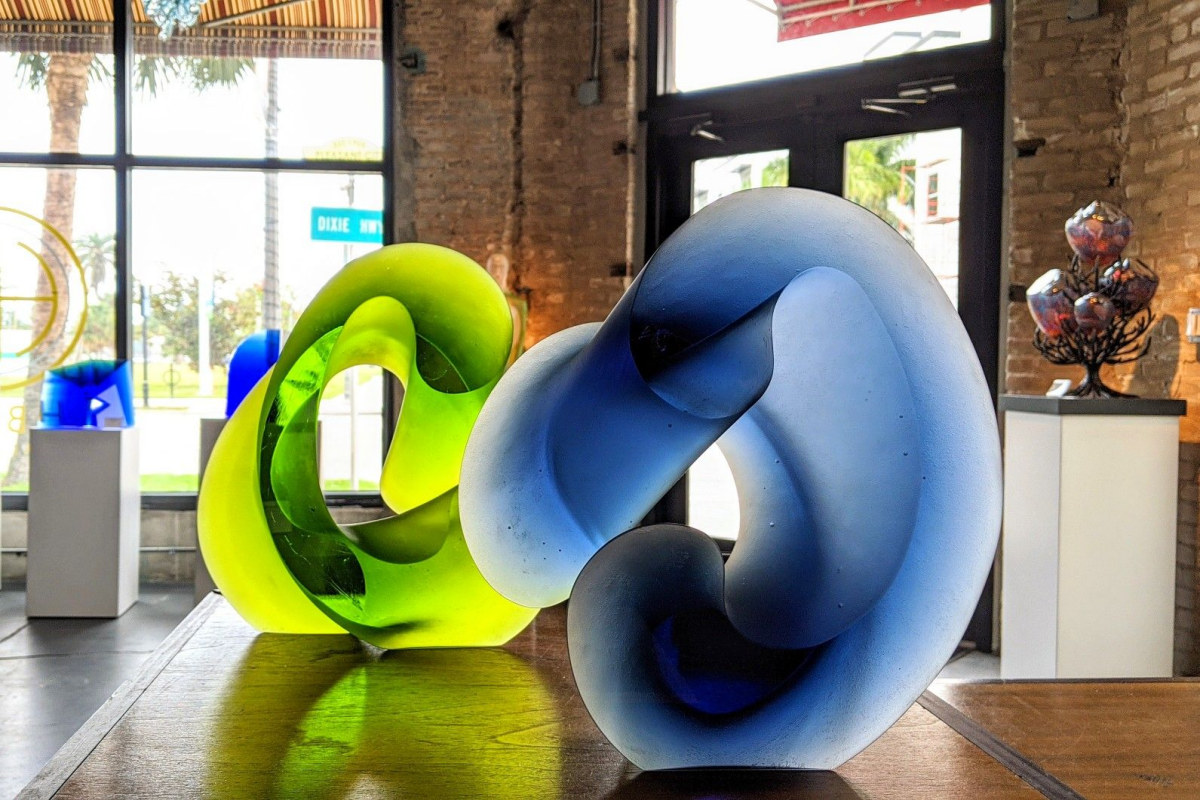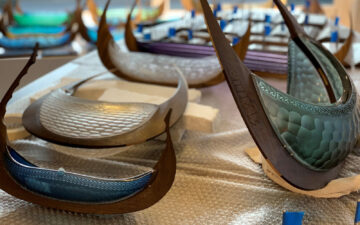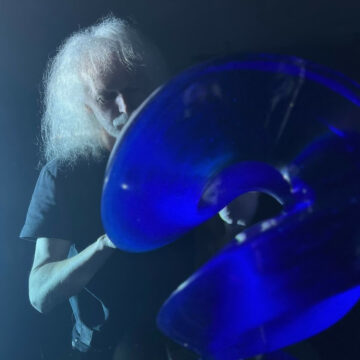The acclaimed danish fashion designer Naja Munthe presented Karin Mørch in her series MUNTHE, WOMEN AND ART in December 2020
Please introduce yourself and what you do?
My name is Karin Mørch. I am a glass artist and have been working with glass as my medium for more than 20 years. I obtained a bachelor’s degree as a glass designer (formgiver), from the School of Glass & Ceramics on Bornholm (KADK) in 2002. I live and work in Copenhagen.
I make sculptural glass, unique pieces with a simple expression, mainly driven from a simple geometrical perspective.
In the last couple of years, I have been lucky enough to see my recognition as an artist expand and luckily my development as an artist has grown with it. I now cooperate with significant galleries in London, Paris, Germany and USA. It is a very exciting time for me, and I am learning a lot about myself and how to make my art into a business.
At the moment I am in the process of creating 8 new pieces for Habatat Galleries in Florida, USA – to be put on display at an online solo exhibition on the 13th of February.
Explain your process . . .
I work a bit like a sculptor. The process is long and demands patience. From thought or idea to final object takes several months. The process usually goes something like this: I create my shape in foam or wax and cast a casting mold with a heat resistant plaster-material over it. Melting out the wax, the negative space fills up with chunks of glass in the desired color.
In a ceramic kiln, the firing is calculated with a max temperature of 850 degrees celcius and the required annealing-process is carefully calculated. Getting this right is always the main concern and it varies depending on the size of the piece. If the annealing process is not just right, the piece will likely crack during cooling. A small piece takes a few days, bigger ones; 10-14 days. The time required grows exponentially with the size, as does the price for the materials as well as the risks.
After the piece is fired and then cooled off, several days are spent grinding and polishing. Some of this work is done with machines, but a lot is done by hand. It is all a very time-consuming process, it’s dirty work that is physically hard and heavy.
I am very fascinated and inspired by glass as a material and all of the gifts it holds. Glass is a fluid material. It can be transparent, reflect its surroundings as a mirror, be clear as a window, and contains possibilities for optical distortions. All of which are phenomena that reflect the world as I see and experience it.
A lot of my artwork is inspired by calligraphies, graphic lines, graffiti and the tendencies happening in my life and in the Universe.
What themes do you pursue in your art?
The simple and abstract expression, which often can be the most difficult to achieve. Opposite attractions, contrasts, surface/curve, blank/mat is all repeated throughout in my works. The two sides that are merged into one solid form, it brings forth a movement and an illusion of an inner core to the piece. It has become my voice, a language.
Glass as a material is a challenge, because there are so many factors to consider in the game. It is a natural living material with its own will. It is forces of nature vs. my idea and mind playing along. I find myself on the edge of the material’s capacity, challenging it back by stretching my craftmanship and the form-giving, to a balance between what looks almost impossible. The sculpture can get a special sense of a vibrant dance to it. Sometimes with a zoomorphic curiosity to it. I love when that happens.
Which female artist inspires you and why?
Iris van Herpen, the fashion designer is so innovative and inspiring in her beautiful creations. I can honestly get lost for hours looking at her work. It is breathtaking. Also the architect Zaha Hadid and sculptor Barbara Hepworth have always been true inspirations to me. They are from two different worlds and times, but have, in my opinion, still so much in common. Their way to bring the curves into the buildings and sculptures, really moves me. They are all strong female artists, and they stand out by being really extraordinary. What they do is so modern, brave and timeless that it almost seems like the expressions they create, come from another world. They expand my mind and inspire me. This is really what I try to seek in myself, just in a smaller scale – through my sculptures. To create some kind of movement that touches others.
What have been the most challenging aspects of being a female artist?
When I became a mother. I constantly felt conflicted and split in two, finding it hard to juggle the feeling of my absence from my family and the passion and the urge to work with glass.
I think this is the main conflict and reason why we do not see more woman in the art scene. We struggle with the fact that it is us giving birth to the children, and we have a natural string attached to this child. Something happens in our psyche in that moment. We transform and have to invent ourselves again.
Motherhood and my work as an artist have been and still are the best ways for me to explore myself as a human. As a woman and a person who is extremely sensitive, I have had to be very persistent and true to my intuitive self, not to give in on the life as an artist. It was a choice I made already as a young teenager, a dream and inner knowing that I have pursued ever since. Keeping the trust in yourself and maintaining the belief in yourself is the hardest.
I am part of a cooperating studio on Islands Brygge named Luftkraft Glasstudio. Here we are 6 female glass artists all sharing the facilities. All are highly skilled and with ambitions to maintain our individual and very different approach to the material of glass. This is a big motivator in my daily work as a female artist, having this workspace amongst equals, a common understanding of the material but also to the female mind.
What is your ultimate goal for your artwork?
That would be, to be able to keep on developing my work with glass, and to make glass art more accepted in the art world and the contemporary art scene around the world. There is so much potential and it would be so awesome to be a force in helping move the boundaries.
As I continue to grow as an artist, the desire to grow the size of the pieces as well is only natural, I think. Making the pieces bigger is a huge challenge and the approach and work methods are so different from how I work now, and it takes a personal development, simultaneously. I am changing and developing along with the work. Maybe it is time for another transformation? It is exciting to see where it will lead.



